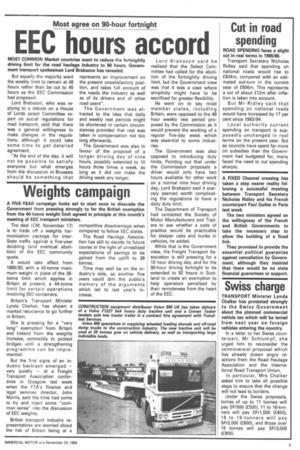Most agree on 90-hour fortnight
Page 5

If you've noticed an error in this article please click here to report it so we can fix it.
EEC hours accord
MOST COMMON Market countries want to reduce the fortnightly driving limit for the road haulage industry to 90 hours, Government transport spokesman Lord Brabazon has revealed.
But equally the majority want the weekly limit to remain at 48 hours rather than be cut to 45 hours as the EEC Commission had proposed.
Lord Brabazon, who was replying to a debate on a House of Lords select Committee repod on social regulations for road transport, said that there was a general willingness to make changes in the regulations, although it could take some time to get detailed agreement.
"At the end of the day, it will not be possible to satisfy everyone but what emerges from the discussion in Brussels should be something that represents an improvement on the present unsatisfactory position, and takes full account of the needs the industry as well as of its drivers and of other road users".
The Government was attracted to the idea that daily and weekly rest periods might be shortened in certain circumstances provided that rest was taken in compensation not too long afterwards.
The Government was also in favour of the proposal of a longer driving day of nine hours, possibly extended to 10 hours three times a week, as long as it did not make the driving week any longer. Lord Brabazon said he realised that the Select Committee had called for the abolition of the fortnightly driving limit, but the Government view was that it was a case where simplicity might have to be sacrificed for greater flexibility.
He went on to say most member states, including Britain, were opposed to the 48 hour weekly rest period proposed by the Commission as it would prevent the working of a regular five-day week which was essential to some industries.
The Government was also opposed to introducing duty limits. Pointing out that under the Commission proposals a driver would only have two hours available for other work on a normal nine hour driving day, Lord Brabazon said it scarcely seemed worth complicating the regulations to have a daily duty limit.
The Department of Transport had contacted the Society of Motor Manufacturers and Traders to see whether a code of practice would be practicable for sleeper cabs and bunks in vehicles, he added.
While that is the Government view, the Freight Transport Association is still pressing for a 10 hour driving day, and for the 90-hour driving fortnight to be extended to 92 hours in Scotland to create an exemption to help operators penalised by their remoteness from the heart of the EEC.
































































































